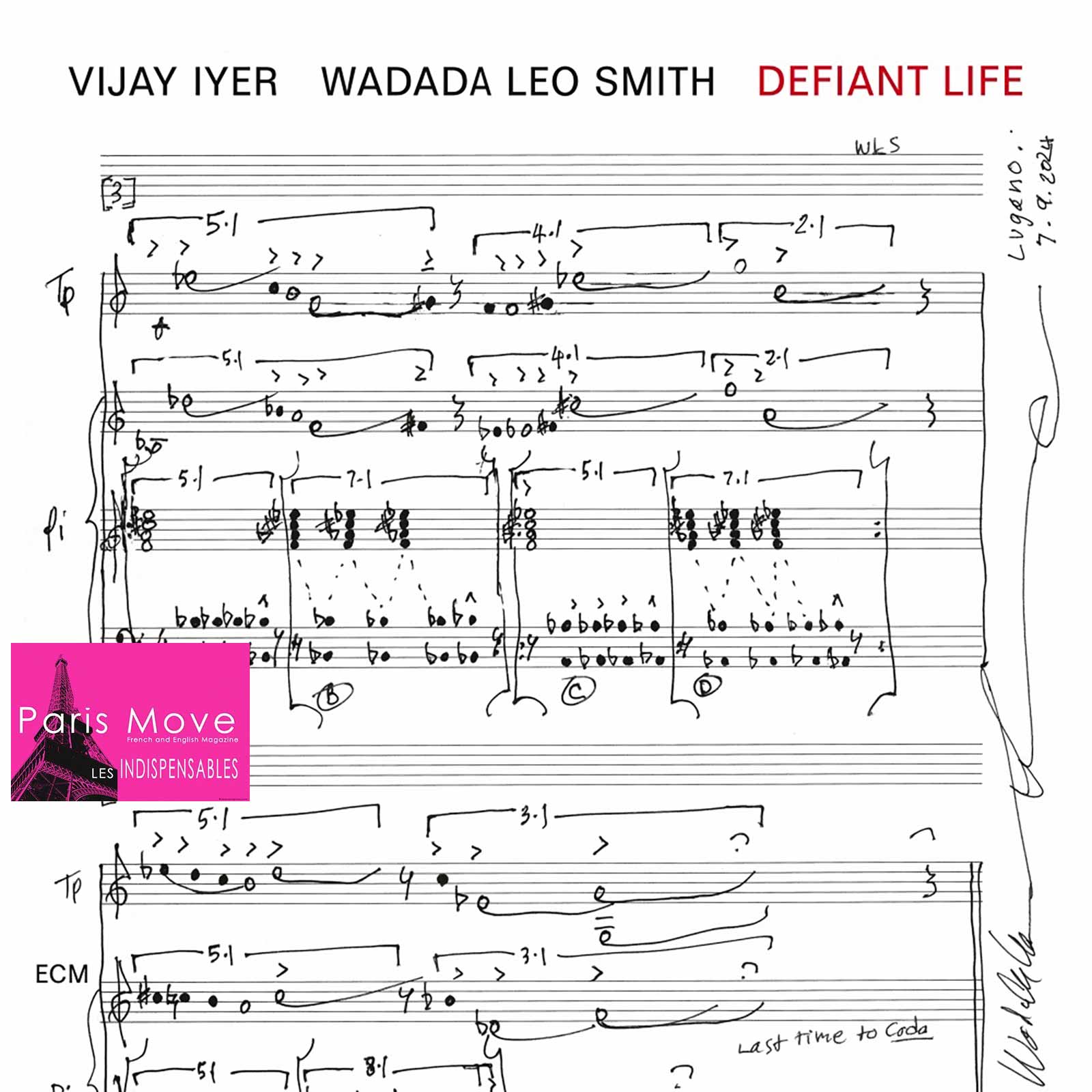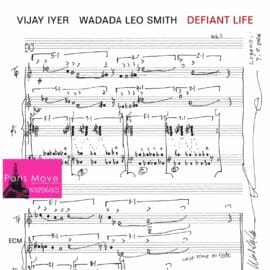| Jazz |

The Art of Sound as Resistance: Vijay Iyer and Wadada Leo Smith’s Defiant Life
In a quiet corner of Lugano, Italy, within the walls of the Auditorio Stelio Molo RSI, a conversation took place that transcended the spoken word. Over the course of two days, two masterful voices of contemporary music, pianist Vijay Iyer and trumpeter Wadada Leo Smith, gave shape to something that defies conventional categories: Defiant Life, their second duo release on the ECM label, is not merely an album. It is a philosophical proposition, a sonic fresco, a testament to what music can become when it is freed from expectation and allowed to speak in its own language.
There are albums that entertain, albums that inform, and albums that challenge. Defiant Life belongs to a rarer species still: the album that reveals. It reveals something about the human condition, about resistance and survival, about fragility and force. ECM describes it as “anchored in the idea that, despite all obstacles, human experience unfolds a net of possibilities.” This isn’t hyperbole. The music here seems to hover between despair and grace, a dialogue forged in deep listening, spiritual conviction, and a mutual trust that borders on reverence.
Smith’s trumpet, unmistakable in its human cry, often seems to question rather than declare. It resists flourish and sentimentality, even as it emotes with aching clarity. Iyer, alternating between acoustic piano and Fender Rhodes, is his equal in restraint, sculpting textures more than melodies, unfolding silences as much as sound. Their interplay is not a duet in the classical sense. It is a cohabitation of sensibilities. A negotiation of space. A quiet revolution in slow motion.
The album’s title, Defiant Life, is not incidental. It speaks to the heart of what is being explored, a resilience that refuses spectacle, a life force asserted not through volume or virtuosity but through sustained attention, through a kind of sonic patience. From the opening piece, Sumud, a word evoking steadfastness in the face of oppression, we are drawn into a landscape where tension simmers, but never breaks. Floating River Requiem mourns with a blues-inflected delicacy, while Elegy: The Pilgrimage traverses doubt and tentative hope. The final track, Procession: Defiant Life, is perhaps the most devastating, a procession not of triumph, but of unyielding dignity.
To call this music “difficult” would be both true and misleading. It is demanding, yes — not because it is inaccessible, but because it demands the listener’s presence. It refuses to explain itself, to cater, or to flatter. And yet, for those who listen, truly listen — it offers something rare: the feeling of discovery unbound by genre or narrative. One does not “understand” this music so much as inhabit it. It is as much a mental and emotional terrain as it is a sonic one.
This terrain is sculpted not only by technique, though both artists possess it in abundance — but by an artistic architecture that becomes audible if one listens deeply enough. The structure is not overt, but it is rigorous. The music is at times confrontational, at times suspended in a kind of meditative stasis, as if hovering just beyond the reach of time. It provokes, interrogates, and, in moments, appears to dissolve altogether, leaving the listener alone with their own subconscious projections, their inner landscapes colored by these sparse, luminous sounds.
And it is this, this evocation of image and sensation, this triggering of memory and vision — that makes Defiant Life more than an artistic object. It is an experience. The subconscious, in dialogue with two radically personal yet strangely universal languages, becomes a co-author. One hears not just notes, but textures of memory. One sees not just musicians, but painters of space and absence.
At the heart of this dialogue lies an undeniable intimacy. Smith and Iyer are not merely playing together; they are communing. Smith’s trumpet, with its precise austerity and spiritual force, meets Iyer’s minimalist expressivity in a way that defies hierarchy. There is no soloist here, no accompanist. Only an egalitarian exchange of breath and touch. Their music is not about boundaries, it is about dissolving them. About the possibility that two distinct artistic worlds can merge into something singular, something necessary.
Can one speak of limits in such a context? Is there a ceiling to their creative reach? It seems not. If anything, this album suggests that the field of possibility expands the more these two artists relinquish control, the more they listen, to each other, and to the silence between them.
In the end, Defiant Life is a kind of cosmic poetry. Its improvisations feel like the murmurs of space itself, or perhaps the echoes of a collective imagination. It is not for everyone, and it should not try to be. This is music for those willing to venture into the unfamiliar, to let go of the predictable and enter a realm where beauty is not decorative, but transformative.
To appreciate such music requires a willingness to encounter wonder without defense. And in doing so, one is left not only moved but humbled, dwarfed, perhaps, by the grace and depth of these two towering figures in contemporary music. Iyer and Smith do not merely perform. They offer us a way of listening, and, perhaps, a way of living.
Thierry De Clemensat
Member at Jazz Journalists Association
USA correspondent for Paris-Move and ABS magazine
Editor in chief – Bayou Blue Radio, Bayou Blue News
PARIS-MOVE, May 4th 2025
Follow PARIS-MOVE on X
::::::::::::::::::::::::
Featured Artists:
Wadada Leo Smith – Trumpet
Vijay Iyer – Piano, Fender Rhodes, Electronics
Tracklist:
Prelude: Survival (Vijay Iyer, Wadada Leo Smith)
Sumud (Vijay Iyer, Wadada Leo Smith)
Floating River Requiem (for Patrice Lumumba)(Wadada Leo Smith)
Elegy: The Pilgrimage (Vijay Iyer, Wadada Leo Smith)
Kite (for Refaat Alareer) (Vijay Iyer)
Procession: Defiant Life (Vijay Iyer, Wadada Leo Smith)

